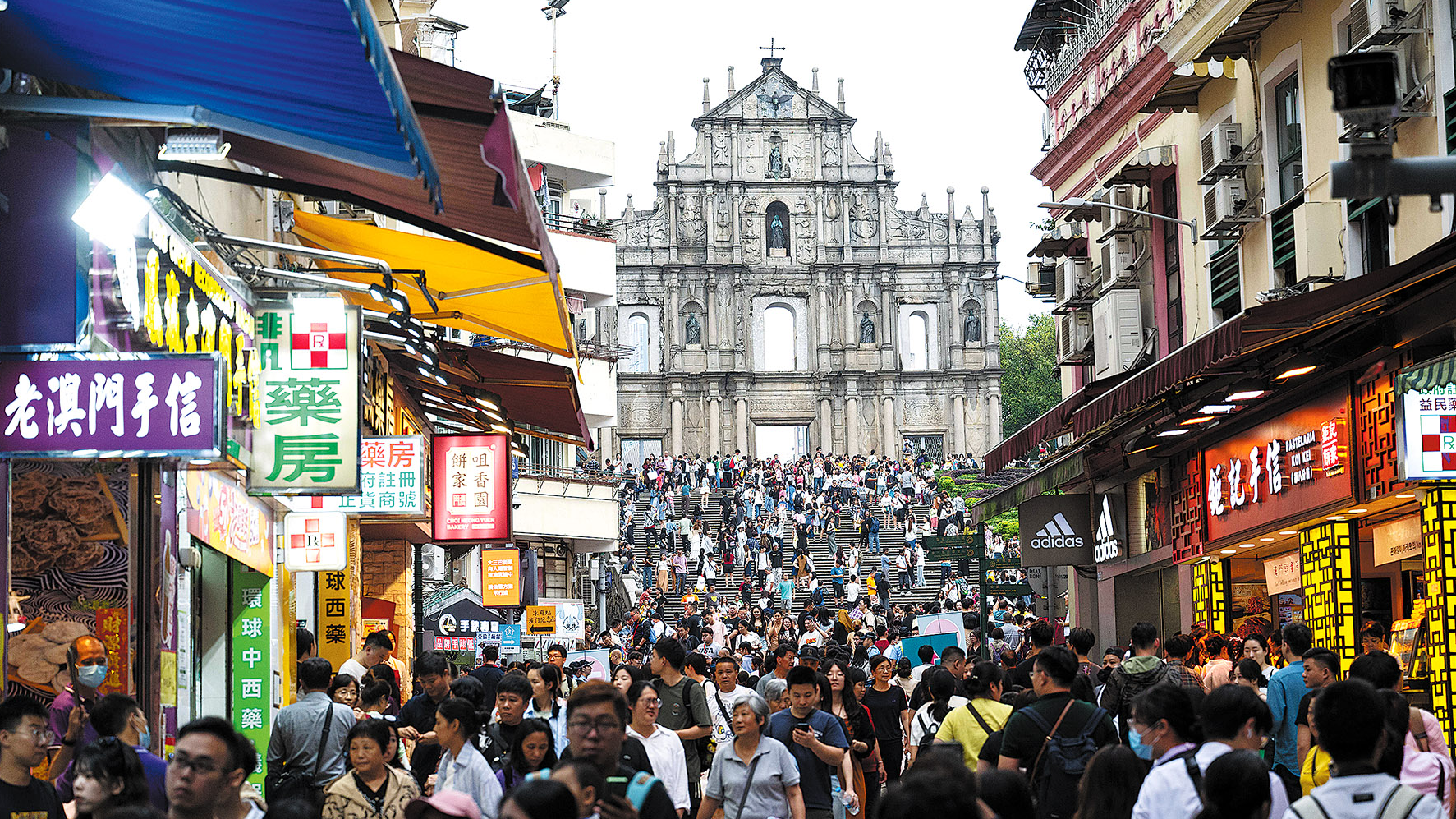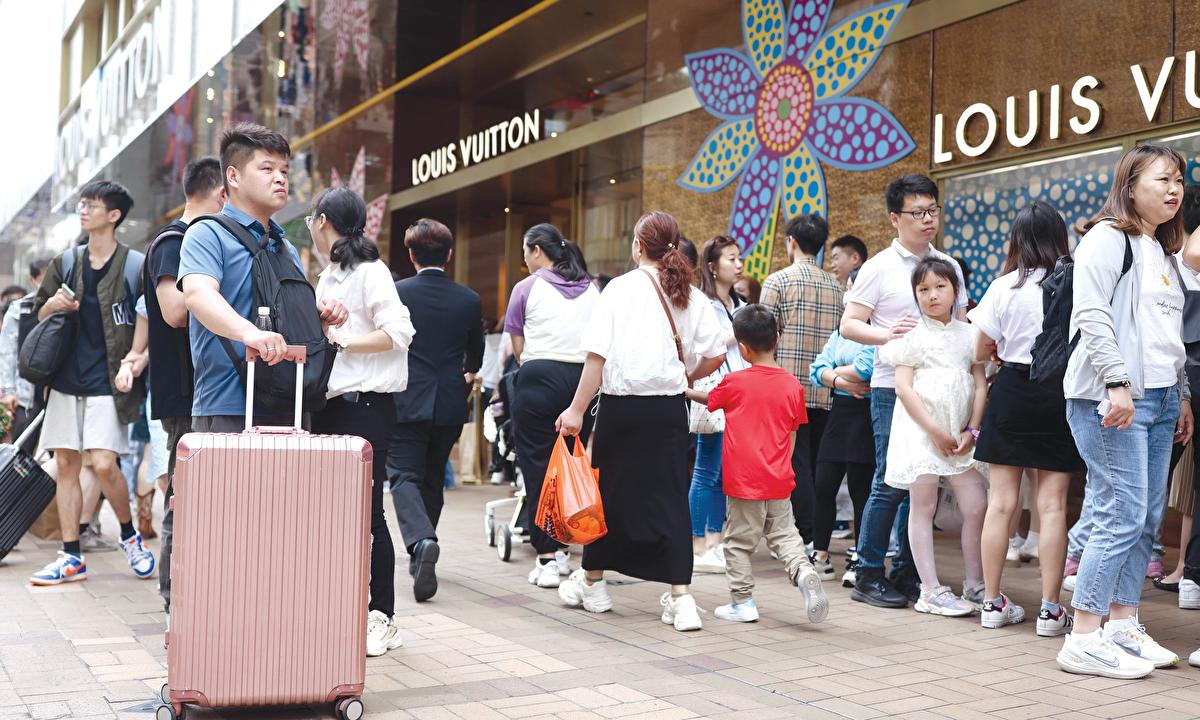
HONG KONG/MACAO/BEIJING – Starting July 1, the duty-free allowance will be raised to a maximum of 15,000 yuan ($2,064) for eligible Chinese mainland tourists traveling to the Hong Kong and Macao special administrative regions, according to a central government announcement on Friday.
The Chinese mainland has consulted with the two SARs under the Closer Economic Partnership Arrangement (CEPA) to reach the decision, which will be included in the CEPA's trade in goods items, according to the Ministry of Commerce.
Mainland tourists aged 18 and above will be entitled to a duty-free quota of 12,000 yuan for self-use items, up from the previous limit of 5,000 yuan. Moreover, those who purchase duty-free goods at designated ports will be granted an allowance of up to 15,000 yuan.
READ MORE: Visitor arrivals to Hong Kong up 20% in May
The new measures will be implemented on July 1 across six ports linking the SARs and the mainland, including Luohu, Futian, Shenzhen Bay, the Hong Kong West Kowloon Station, the Hong Kong-Zhuhai-Macao Bridge and Gongbei connecting Zhuhai and Macao, according to a notice jointly released by the Ministry of Finance, the General Administration of Customs and State Taxation Administration.
Starting Aug 1, the measures will be extended to all entry points, except Hengqin port, the notice added.
The new measure will enhance the shopping experience for mainland visitors in Hong Kong and allow them greater flexibility when shopping, which is beneficial for Hong Kong in attracting more visitors and boosting the development of diversified tourism.
John Lee Ka-chiu, Chief Executive, HKSAR
Relevant provisions on carrying luggage items by passengers who travel to and from Hong Kong and Macao multiple times in a short period of time, as well as other existing provisions, remain unchanged, it said.
Hong Kong Chief Executive John Lee Ka-chiu said it shows “the central government’s support for the HKSAR’s economic development”.
“The new measure will enhance the shopping experience for mainland visitors in Hong Kong and allow them greater flexibility when shopping, which is beneficial for Hong Kong in attracting more visitors and boosting the development of diversified tourism. Additionally, the measure can help stimulate the retail atmosphere in Hong Kong and bring vibrancy to the local economy,” he said.
Expressing gratitude for the central government measures, Macao Chief Executive Ho Iat Seng also said the new measures would stimulate tourism consumption growth and benefit more small and medium-sized enterprises in Macao, injecting new momentum into the SAR's overall economic development.
He said this is an important measure taken by the central government in response to the demands of Macao society, once again demonstrating the central government's attention and care for Macao SAR.
ALSO READ: HK launches HK$1.2b shopping fest to boost spending
According to an HKSAR government estimate, the new arrangement will bring an additional HK$8.8 billion ($1.12 billion) to HK$17.6 billion in shopping expenditure to the city, generating about HK$2.7 billion to HK$5.4 billion added value to the Hong Kong economy.

“The adjustment in the duty-free quota is expected to encourage more mainland visitors to spend in Hong Kong, providing a vital boost to the city’s tourism and retail sectors,” said Kenny Shui, vice-president of think tank Our Hong Kong Foundation.
In the first five months of this year, visitor arrivals soared 78 percent year-on-year, reaching 18 million, with mainland tourists making up the majority of the influx
In the first five months of this year, visitor arrivals soared 78 percent year-on-year, reaching 18 million, with mainland tourists making up the majority of the influx.
The average length of stay for overnight mainland visitors was 3.1 nights in the first quarter, with an average per capita spending of HK$5,400.
CEPA is a free trade agreement concluded by the Chinese mainland and Hong Kong covering four areas – trade in goods, trade in services, investment, and economic and technical cooperation. The mainland and Hong Kong signed the agreement on June 29, 2003, while it was signed between the mainland and Macao on Oct 17 the same year.
ALSO READ: HK, mainland officials sign MoU to boost food safety cooperation
According to the information provided by Hong Kong's Census and Statistics Department, the bilateral merchandise trade between Hong Kong and the mainland in 2003, before the implementation of CEPA, was HK$1,528.2 billion.
After the full implementation of CEPA, total bilateral merchandise trade increased to HK$4,648.4 billion in 2022, recording a more than twofold growth, and an average growth of 6 percent per annum.
Contact the writer at tianyuanzhang@chinadailyhk.com
With Xinhua inputs


